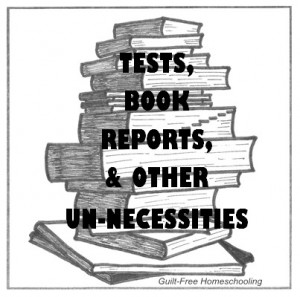Tests are valuable only if you do not know what your student has learned. If Johnny spends 45 minutes telling me about something that only took him 20 minutes to read, he is ready to tackle the next thing. He does not need to waste time (his or mine) taking a test or writing a book report. Tests are great for a classroom of 30 kids and a teacher who has no idea who knows what. Unless you have an extremely large homeschool family, you probably have a pretty good idea of what is being learned.
It is my personal opinion that book reports should be banned. Reading books should be encouraged, but I do not want to ruin a budding love of reading by enforcing reports. Reading well-written books teaches by example: sentence structure, grammar (formal/descriptive and informal/conversational), spelling, punctuation, etc. A student who reads often and reads from a variety of sources will pick up a surprising amount by observation. Then, and only then, should they be expected to write.
My students participated in a co-op class in novel-writing (meeting twice a month for a semester). My daughter, a voracious reader, had little difficulty with descriptions, character development, etc. My son, who had read very little on his own at that point, struggled tremendously. He had great difficulty trying to put his thoughts on paper. His scene descriptions were awkward, and he felt every scene should be done with only dialogue. I eventually realized that he was not writing a book, he was writing a screenplay — he was more familiar with movies than with books and therefore wanted to use that format. I changed plans and rearranged my son’s assignments to include more time for reading and a greater variety of reading materials, emphasizing things of special interest to him. Sometimes I allowed him to watch a video, then read the book afterward, reasoning that knowing the plot ahead of time would help to keep his interest as the story slowly developed through the pages of the book. It worked. His reading speed increased dramatically, his comprehension level increased, and his understanding of grammatical rules increased.
After a couple of years of heavy-on-the-reading-time-but-no-writing lessons, I again brought in a serious writing assignment. Wow! What a difference! I actually had to (tactfully) ask him where the idea had come from for the paper, because I suspected he might have plagiarized it from a magazine article. Not the case. He had used a magazine article as his resource material, but it was an article he had read months before at the library and just used the facts from memory. (Several weeks into his first semester of college English composition, the instructor pulled my son aside and remarked, “You know you don’t really belong in this class — you already know how to write very well!”)



 Guilt-Free Homeschooling is the creation of Carolyn Morrison and her daughter, Jennifer Leonhard. After serious disappointments with public school, Carolyn spent the next 11 years homeschooling her two children, from elementary to high school graduation and college admission. Refusing to force new homeschooling families to re-invent the wheel, Carolyn and Jennifer now share their encouragement, support, tips, and tricks, filling their blog with "all the answers we were looking for as a new-to-homeschooling family" and making this website a valuable resource for parents, not just a daily journal. Guilt-Free Homeschooling -- Equipping Parents for Homeschooling Success!
Guilt-Free Homeschooling is the creation of Carolyn Morrison and her daughter, Jennifer Leonhard. After serious disappointments with public school, Carolyn spent the next 11 years homeschooling her two children, from elementary to high school graduation and college admission. Refusing to force new homeschooling families to re-invent the wheel, Carolyn and Jennifer now share their encouragement, support, tips, and tricks, filling their blog with "all the answers we were looking for as a new-to-homeschooling family" and making this website a valuable resource for parents, not just a daily journal. Guilt-Free Homeschooling -- Equipping Parents for Homeschooling Success!

Speak Your Mind